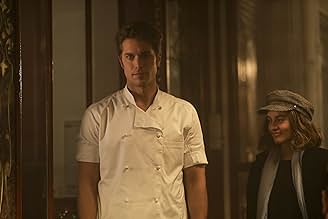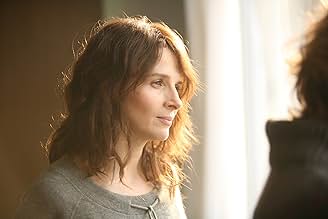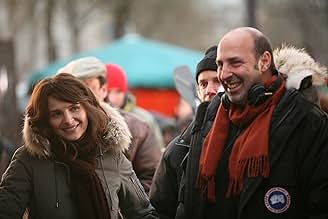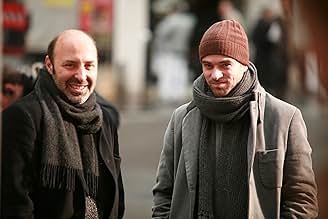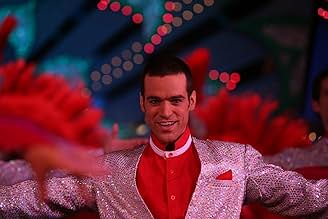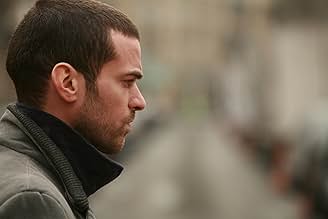Paris
- 2008
- Tous publics
- 2h 10m
IMDb RATING
6.8/10
13K
YOUR RATING
A ex-dancer has a heart problem and even with a transplant, he may still only have a few months to live. Time's spent looking at people/life in Paris from his balcony. His single mom sister ... Read allA ex-dancer has a heart problem and even with a transplant, he may still only have a few months to live. Time's spent looking at people/life in Paris from his balcony. His single mom sister moves in with her 3 kids to look after him.A ex-dancer has a heart problem and even with a transplant, he may still only have a few months to live. Time's spent looking at people/life in Paris from his balcony. His single mom sister moves in with her 3 kids to look after him.
- Awards
- 4 nominations total
- Director
- Writer
- All cast & crew
- Production, box office & more at IMDbPro
Featured reviews
No one, but no one, makes movies that better capture a sense of place than Cedric Klapisch. Since the miraculous little When the Cat's Away (Chacun Cherche son Chat, 1996) he's consistently been able to evoke a real sense of lived lives and inhabited city spaces. Wonderful then, to discover that after all the travels of The Spanish Apartment (2002) and Russian Dolls (2005) he's returned to Paris to make one of the best films ever made of those little universes within the City of Light. That said if you know nothing about France or its history and culture you just won't get it!
The hook on which this multidimensional movie hangs is Pierre (Klapisch favorite, Romain Duris), a professional dancer who's justlearned that his heart is failing. A transplant may save him, maybe not. All this has echoes of the great Agnes Varda film, Cleo de 5 a 7 (1962), where Cleo, a young singer played by Corinne Marchand, also gets a frightening diagnosis and she too, walks the streets of the city facing her own death. Maybe Paris (the film) achieves even more as a kind of aubade or farewell to the dance of life that ceaselessly crosses Paris (the city) in time and in space.
The centre of the film is Pierre's sister Élise (Juliette Binoche in her most relaxed and charming performance in years). Elise moves in with Pierre (along with her children!) to help out and her own little adventures as she shops at the local market opens out the film as we discover the complex and many layered live of the market workers, especially glum Jean (Albert Dupontel) and his soon to be ex wife Caroline (Julie Ferrier).
Another story thread follows terminally bored history professor, Roland Verneuil (Fabrice Luchini) embarking on a new career as a TV pundit: these scenes are beautifully satirical yet also curiously touching.
Among the many delights of the movie is a great dream scene where Roland's brother, architect Philippe Verneuil (François Cluzet) is plunged into the 3D Universe used to sell off one of his middle class housing Projects and floats like a tormented Mario Brother from some gleaming modernist disaster to rapturous potential buyers and back again. This delicious scene goes on just long bought to make more than a few silly dreams of home improvement (let alone all those fantastical TV Reality shows) seem, as they are, utterly absurd , yet also quite nightmarish in their silly faith in problem solving by buying stuff. For this alone the movie's worth the price of admission!
Interwoven, too, is the story of the anxious young Benoit in Cameroon, adrift and about to try to join his Paris based émigré family in that most dangerous of ways, the open boat from Africa to Europe. All French life, it seems, is touched upon, not least the political morass facing governments as they grapple with the problem of the poor and dispossessed out in the projects. The music track is equally complex, with that old favorite (since Truffaut used it in Shoot the Piano Player almost fifty years ago!) Erik Satie's Gymnopedie Number 1 again weaving its extraordinary spell! You just have to be there!
Klapisch has done something marvelous here, a film full of ideas and humanity, yet one that somehow enables us to engage with and care for so many complex characters without ever having to resort to stereotypes. It's a great achievement and a glorious movie about that city to which we must all return in our dreams: Paris.
The hook on which this multidimensional movie hangs is Pierre (Klapisch favorite, Romain Duris), a professional dancer who's justlearned that his heart is failing. A transplant may save him, maybe not. All this has echoes of the great Agnes Varda film, Cleo de 5 a 7 (1962), where Cleo, a young singer played by Corinne Marchand, also gets a frightening diagnosis and she too, walks the streets of the city facing her own death. Maybe Paris (the film) achieves even more as a kind of aubade or farewell to the dance of life that ceaselessly crosses Paris (the city) in time and in space.
The centre of the film is Pierre's sister Élise (Juliette Binoche in her most relaxed and charming performance in years). Elise moves in with Pierre (along with her children!) to help out and her own little adventures as she shops at the local market opens out the film as we discover the complex and many layered live of the market workers, especially glum Jean (Albert Dupontel) and his soon to be ex wife Caroline (Julie Ferrier).
Another story thread follows terminally bored history professor, Roland Verneuil (Fabrice Luchini) embarking on a new career as a TV pundit: these scenes are beautifully satirical yet also curiously touching.
Among the many delights of the movie is a great dream scene where Roland's brother, architect Philippe Verneuil (François Cluzet) is plunged into the 3D Universe used to sell off one of his middle class housing Projects and floats like a tormented Mario Brother from some gleaming modernist disaster to rapturous potential buyers and back again. This delicious scene goes on just long bought to make more than a few silly dreams of home improvement (let alone all those fantastical TV Reality shows) seem, as they are, utterly absurd , yet also quite nightmarish in their silly faith in problem solving by buying stuff. For this alone the movie's worth the price of admission!
Interwoven, too, is the story of the anxious young Benoit in Cameroon, adrift and about to try to join his Paris based émigré family in that most dangerous of ways, the open boat from Africa to Europe. All French life, it seems, is touched upon, not least the political morass facing governments as they grapple with the problem of the poor and dispossessed out in the projects. The music track is equally complex, with that old favorite (since Truffaut used it in Shoot the Piano Player almost fifty years ago!) Erik Satie's Gymnopedie Number 1 again weaving its extraordinary spell! You just have to be there!
Klapisch has done something marvelous here, a film full of ideas and humanity, yet one that somehow enables us to engage with and care for so many complex characters without ever having to resort to stereotypes. It's a great achievement and a glorious movie about that city to which we must all return in our dreams: Paris.
The movie is mostly made of vignettes following several characters, loosely interconnected in the city of Paris. Sounds familiar. To be honest, I've grown tired of the many dramas borrowing that formula. It's become an epidemic, especially since Magnolia. And so, I did not expect to enjoy Paris all that much. But I loved it and it moved me by its stripped down, sincere approach.
Director and writer Cédric Klapisch, unlike several of his contemporaries, did not feel the need to employ convoluted means to link these characters, or end the movie on some sort of unifying, highly artificial bang. Klapish wisely elects to concentrate on building strong characters. He succeeds, so much so that it becomes easy for him to create simple, believable story lines for them. The real link between them? They are fallible, restless, tentative, longing... in other words, they are human.
There's a large cast here and Klepish mostly concentrates on a few of them. Many of the smaller parts are actually as intriguing as the bigger roles and I caught myself wondering what would happen to those characters. But Klapisch stays the course and ends the movie much like it began. A lot is left unresolved, much like life. No Hollywood ending here but I could certainly have followed those characters for another hour if need be.
A beautiful, stripped down story but enough subtext and genuine quality to make for a great and lasting movie experience.
Director and writer Cédric Klapisch, unlike several of his contemporaries, did not feel the need to employ convoluted means to link these characters, or end the movie on some sort of unifying, highly artificial bang. Klapish wisely elects to concentrate on building strong characters. He succeeds, so much so that it becomes easy for him to create simple, believable story lines for them. The real link between them? They are fallible, restless, tentative, longing... in other words, they are human.
There's a large cast here and Klepish mostly concentrates on a few of them. Many of the smaller parts are actually as intriguing as the bigger roles and I caught myself wondering what would happen to those characters. But Klapisch stays the course and ends the movie much like it began. A lot is left unresolved, much like life. No Hollywood ending here but I could certainly have followed those characters for another hour if need be.
A beautiful, stripped down story but enough subtext and genuine quality to make for a great and lasting movie experience.
A wonderfully complex study of both the city, and it's people on a wonderfully complex group of characters. Every one was as interesting as any other, regardless of the stature of the actor playing them, and you were invested in them all because of it. Juliette Binoche and Albert Dupontel were the most familiar names to me, but their characters were not allowed to dominate the story.
All along the way you were taken on journeys that were unsignposted and shocking, in some cases, because of it.
A quite extraordinary tale that deserves a far wider audience than it is likely to get. Overall the film was a shining example, in my opinion, of what makes French cinema the best in the world.
All along the way you were taken on journeys that were unsignposted and shocking, in some cases, because of it.
A quite extraordinary tale that deserves a far wider audience than it is likely to get. Overall the film was a shining example, in my opinion, of what makes French cinema the best in the world.
Paris is a kaleidoscopic view of that great City of Light inhabited with a variety of individuals each of whom is consumed with life and love and living and dying. Cédric Klapisch has written and directed this richly populated canvas as a background of a tender story of a Moulin Rouge male dancer Pierre (Romain Duris) who is diagnosed with a terminal heart disease requiring transplantation if he is to survive. But in the end the many characters introduced in 'incidental stories' have become so interesting that, instead of providing simply a background for Pierre's portrait, they become an integral part of the drama as well as indelibly stamped on the viewer's mind.
Pierre has kept his illness secret, yet when faced with the dire concept of a transplant he confides in his sister Élise (Juliette Binoche), a single mother of three, who takes him in to fill his boring days of self confinement. There is a palpable magic between the two as Élise attempts to bring Pierre out into the world of hope and of living. Incidental to her life are trips to the market where she observes the lives of the grocers and discovers their private lifestyles, information shared freely with the viewer. A Parisian North African communicates with his brother at home with a postcard of Paris, seducing the brother to brave all odds to come to the city. We also meet a jaded art historian Roland Verneuil (Fabrice Luchini) whose father has just died, an event that devastates his emotional brother Philippe (François Cluzet): Roland proceeds to have an affair with a student but his physical awakening is abruptly altered by the realities of Parisian life while Philippe progresses through his seemingly mundane existence toward a surprise ending. The grocers seek adventures with a group of girls among whom is the ex-wife of one of the men and in the process we observe the varying reactions of interpersonal relationships tested away from the eyes of group participation. All of these stories are white noise to Pierre's situation, and though Élise is able to make Pierre 'dance again' at a party of his fellow dancers she organizes, in the end Pierre is left to care for Élise's children while Élise finally opens her frozen heart to a new romance. At this point Pierre receives the inevitable telephone call that a transplant is ready, and as he proceeds to the hospital he opens his mind to the beauties of Paris. Some of the vignettes we have observed are completed while most simply continue - just like life in the glorious city so often considered the city of love.
All of the many roles are enacted by gifted actors, the cinematography offers us a different view of Paris than that of postcards and travel brochures, and the musical score ranges from popular music to the haunting 'Gnossiemme No. 1' of Erik Satie which is Pierre's theme music. At times the viewer feels lost in the complex overlay of the many stories being told, but settling back in a chair and just absorbing the film results in an evening of Parisian intoxication.
Grady Harp
Pierre has kept his illness secret, yet when faced with the dire concept of a transplant he confides in his sister Élise (Juliette Binoche), a single mother of three, who takes him in to fill his boring days of self confinement. There is a palpable magic between the two as Élise attempts to bring Pierre out into the world of hope and of living. Incidental to her life are trips to the market where she observes the lives of the grocers and discovers their private lifestyles, information shared freely with the viewer. A Parisian North African communicates with his brother at home with a postcard of Paris, seducing the brother to brave all odds to come to the city. We also meet a jaded art historian Roland Verneuil (Fabrice Luchini) whose father has just died, an event that devastates his emotional brother Philippe (François Cluzet): Roland proceeds to have an affair with a student but his physical awakening is abruptly altered by the realities of Parisian life while Philippe progresses through his seemingly mundane existence toward a surprise ending. The grocers seek adventures with a group of girls among whom is the ex-wife of one of the men and in the process we observe the varying reactions of interpersonal relationships tested away from the eyes of group participation. All of these stories are white noise to Pierre's situation, and though Élise is able to make Pierre 'dance again' at a party of his fellow dancers she organizes, in the end Pierre is left to care for Élise's children while Élise finally opens her frozen heart to a new romance. At this point Pierre receives the inevitable telephone call that a transplant is ready, and as he proceeds to the hospital he opens his mind to the beauties of Paris. Some of the vignettes we have observed are completed while most simply continue - just like life in the glorious city so often considered the city of love.
All of the many roles are enacted by gifted actors, the cinematography offers us a different view of Paris than that of postcards and travel brochures, and the musical score ranges from popular music to the haunting 'Gnossiemme No. 1' of Erik Satie which is Pierre's theme music. At times the viewer feels lost in the complex overlay of the many stories being told, but settling back in a chair and just absorbing the film results in an evening of Parisian intoxication.
Grady Harp
To day I went to see "Paris" and hoped to win a trip to Paris from Sydney out of it! I had seen L'auberge espagnole and had no idea of the link! To top this, by accident I caught a french movie on TV to night perhaps already running for 10 minutes and it was Russian Dolls! Again I did not realise it was related, even called a Sequel to l'auberge espagnole! I enjoyed the 3 movies each on their own way. "Paris", my birth city, I did enjoy immensely, yet I could have imagine its story in any other city. Although it was nice to catch up with sites I have not seen for 25 years and left nearly 40 years ago, but to me it was very much this cocktail of people and their personal situation that moved me so much. Just like everyday life with its humor, sadness and pain all this with a comfortable music that actually did ease a little the pain. Again I thank those who write so well here and gave a concise and very interesting account of this wonderful film. I think one of these writings should appear with the main page of the film rather than tentative account like mine. Bu if by chance you are reading mine I'd like to let you know that if you go to see this movie, just go with the flow and you should not be disappointed.
Did you know
- TriviaAs end credits conclude, the choreographed dance show with Pierre shown earlier has a brief repeat.
- GoofsWhen the shop-owner of the bakery sell a baguette she asks for 80 cent, doesn't register it in the till, which has the figures 0,00 than it changes to 0,78 than back to 0,00 again.
- SoundtracksMunivers de Paris
Written by Robert Burke (as R. Burke) and Loïc Dury (as L. Dury)
Performed by Kraked Unit
Universal Music Publishing
MGB / Kraked - ce qui me meut production
- How long is Paris?Powered by Alexa
Details
- Release date
- Country of origin
- Official site
- Language
- Also known as
- Париж
- Filming locations
- Production companies
- See more company credits at IMDbPro
Box office
- Budget
- $12,000,000 (estimated)
- Gross US & Canada
- $1,010,194
- Opening weekend US & Canada
- $46,518
- Sep 20, 2009
- Gross worldwide
- $23,328,518
- Runtime2 hours 10 minutes
- Color
- Sound mix
- Aspect ratio
- 2.35 : 1
Contribute to this page
Suggest an edit or add missing content



